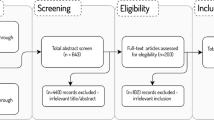Abstract
Throughout the years, healthcare has been one of the privileged areas to apply the information discovery process, empowering and supporting medical staff on their daily activities. One of the main reasons for its success is the availability of medical expertise, which can be incorporated in training models to reach higher levels of performance. While this has been done painfully and manually, during the preparation step, it has become hindered with the advent of AutoML. In this paper, we present the automation of data preparation and feature engineering, while exploring domain knowledge represented through extended entity-relationship (EER) diagrams. A COVID-19 case study shows that our automation outperforms existing AutoML tools, such as auto-sklearn [4], both in quality of the models and processing times.
Access this chapter
Tax calculation will be finalised at checkout
Purchases are for personal use only
Similar content being viewed by others
References
Adam, D.: A guide to R - the pandemic’s misunderstood metric. Nature 583(7816), 346–348 (2020)
Donoho, S., Rendell, L.: Feature construction using fragmentary knowledge. In: Liu, H., Motoda, H. (eds.) Feature Extraction, Construction and Selection. SECS, vol. 453, pp. 273–288. Springer, Boston (1998). https://doi.org/10.1007/978-1-4615-5725-8_17
Elmasri, R., Navathe, S.B.: The Enhanced Entity-Relationship (EER) Model, pp. 107–135. Addison-Wesley, Boston (2000)
Feurer, M., Eggensperger, K., Falkner, S., Lindauer, M., Hutter, F.: Auto-sklearn 2.0: hands-free autoML via meta-learning. arXiv preprint arXiv:2007.04074 (2020)
Gabrilovich, E., Markovitch, S.: Wikipedia-based semantic interpretation for natural language processing. J. Artif. Intell. Res. 34, 443–498 (2009)
Galhotra, S., Khurana, U., Hassanzadeh, O., Srinivas, K., Samulowitz, H., Qi, M.: Automated feature enhancement for predictive modeling using external knowledge. In: 2019 International Conference Data Mining Workshops, pp. 1094–1097. IEEE (2019)
Garg, A., Mago, V.: Role of machine learning in medical research: a survey. Comput. Sci. Rev. 40, 100370 (2021)
Hu, Y.J., Kibler, D.: Generation of attributes for learning algorithms. In: AAAI/IAAI, vol. 1, pp. 806–811 (1996)
Hutter, F., Kotthoff, L., Vanschoren, J.: Automated Machine Learning: Methods, Systems, Challenges. Springer, Cham (2019). https://doi.org/10.1007/978-3-030-05318-5
Markovitch, S., Rosenstein, D.: Feature generation using general constructor functions. Mach. Learn. 49, 59–98 (2004)
Momeni, Z., Hassanzadeh, E., Abadeh, M.S., Bellazzi, R.: A survey on single and multi omics data mining methods in cancer data classification. J. Biomed. Inform. 107, 103466 (2020)
Salguero, A.G., Medina, J., Delatorre, P., Espinilla, M.: Methodology for improving classification accuracy using ontologies: application in the recognition of activities of daily living. J. Ambient Intell. Hum. Comput. 10(6), 2125–2142 (2019)
Shilo, S., Rossman, H., Segal, E.: Axes of a revolution: challenges and promises of big data in healthcare. Nat. Med. 26(1), 29–38 (2020)
Waring, J., Lindvall, C., Umeton, R.: Automated machine learning: review of the state-of-the-art and opportunities for healthcare. Artif. Intell. Med. 104, 101822 (2020)
Yang, H., Bath, P.A.: The use of data mining methods for the prediction of dementia: evidence from the English longitudinal study of aging. IEEE J. Biomed. Health Inform. 24(2), 345–353 (2020)
Acknowledgments
This work was supported by national funds by Fundação para a Ciência e Tecnologia (FCT) through project VizBig (PTDC/CCI-CIF/28939/2017).
Author information
Authors and Affiliations
Corresponding author
Editor information
Editors and Affiliations
Rights and permissions
Copyright information
© 2022 The Author(s), under exclusive license to Springer Nature Switzerland AG
About this paper
Cite this paper
Afonso, T., Antunes, C. (2022). Automatic Exploration of Domain Knowledge in Healthcare. In: Yin, H., Camacho, D., Tino, P. (eds) Intelligent Data Engineering and Automated Learning – IDEAL 2022. IDEAL 2022. Lecture Notes in Computer Science, vol 13756. Springer, Cham. https://doi.org/10.1007/978-3-031-21753-1_8
Download citation
DOI: https://doi.org/10.1007/978-3-031-21753-1_8
Published:
Publisher Name: Springer, Cham
Print ISBN: 978-3-031-21752-4
Online ISBN: 978-3-031-21753-1
eBook Packages: Computer ScienceComputer Science (R0)




